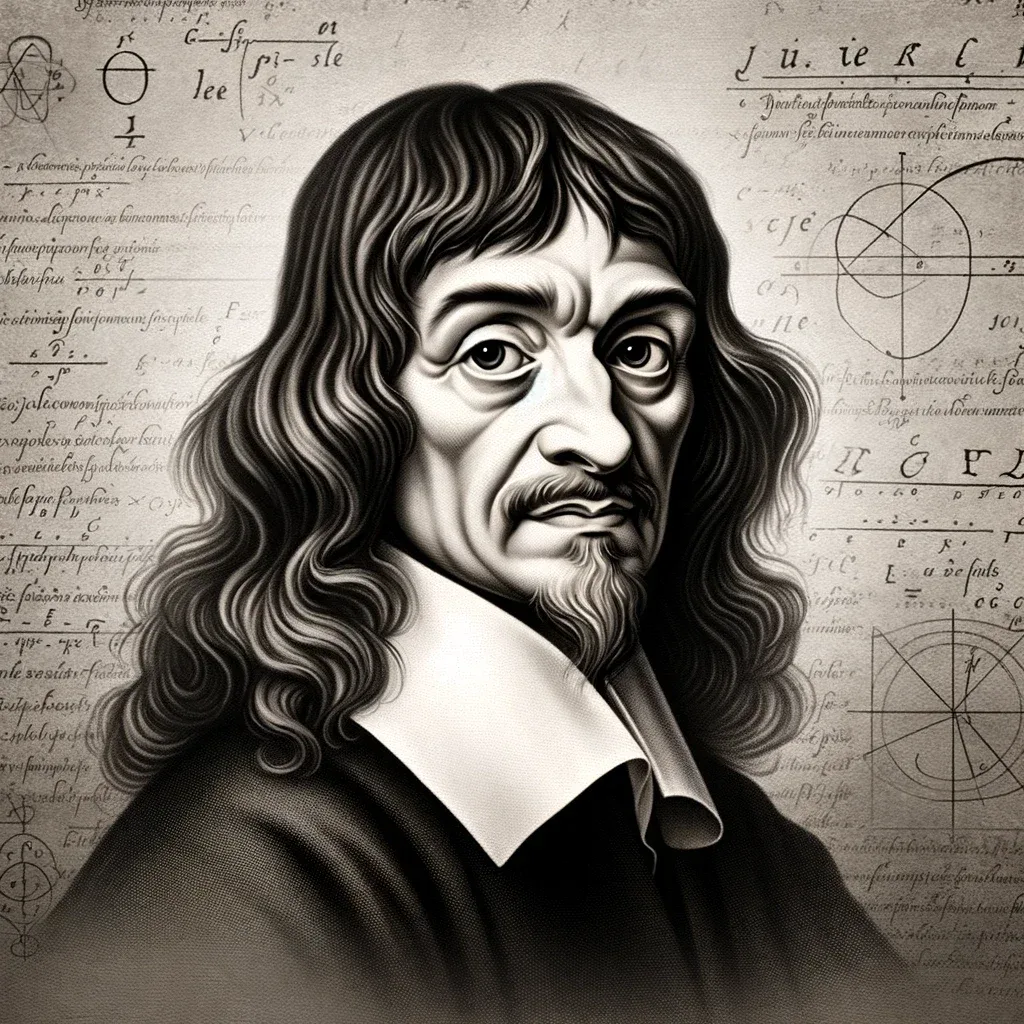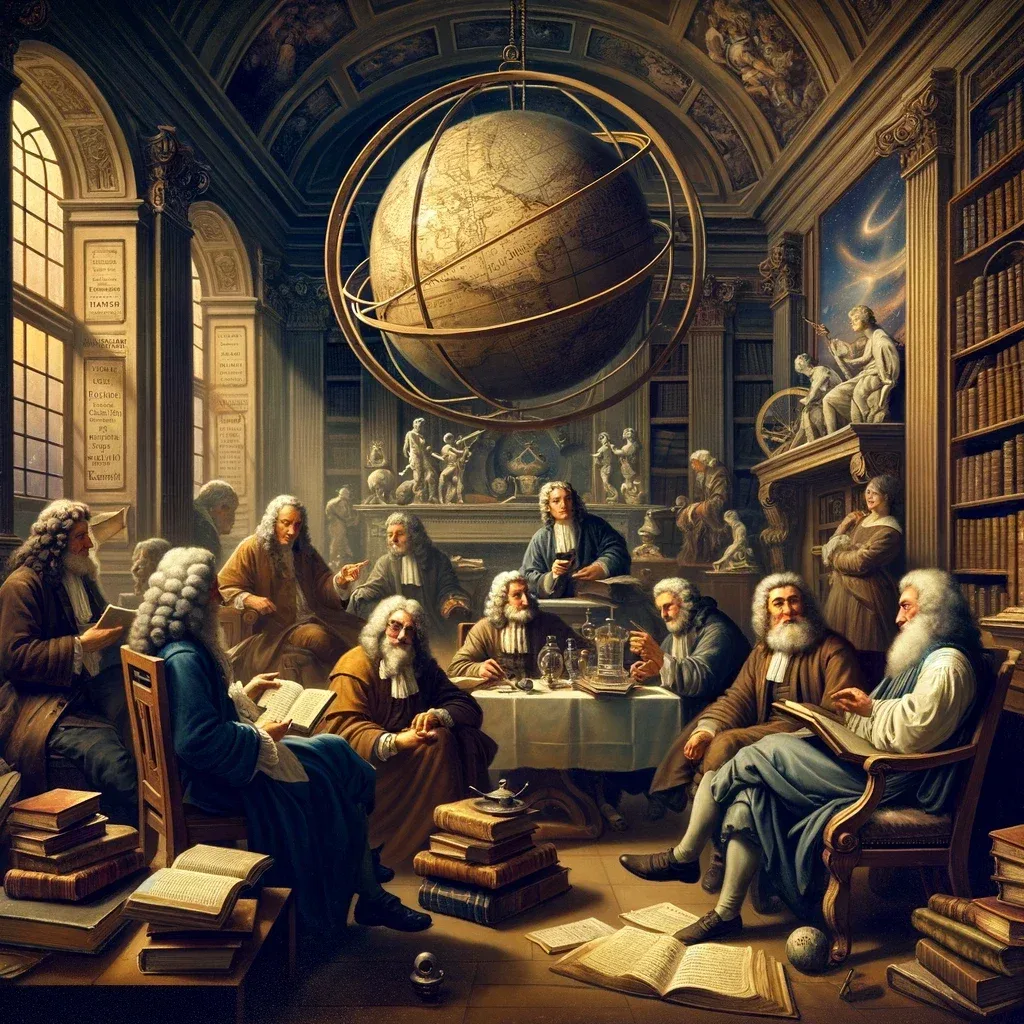The phrase “I think, therefore I am” has become one of the most well-known in Western philosophy, synthesizing a central idea that still resonates in contemporary debates about knowledge, consciousness and existence. Attributed to the French philosopher René Descartes, this maxim is a fundamental pillar of rationalism and modern philosophy. In this article, we will explore the origin, meaning and implications of this famous phrase, delving deeply into the philosophical context that gave it life.

The Genius of Methodical Doubt: René Descartes
Who was René Descartes?
René Descartes (1596-1650) was a French mathematician, scientist and philosopher, considered the father of modern philosophy. His revolutionary approach was to doubt everything that could be questioned in order to arrive at indisputable truths. It was within this systematic doubt that Descartes found the certainty of his own existence, encapsulated in the phrase “I think, therefore I am”.
The Methodology of Skepticism
Descartes developed a method that began with hyperbolic doubt – questioning the veracity of everything, including the testimony of the senses and mathematical concepts. His goal was to establish an unshakable foundation for true knowledge.
“Cogito, Ergo Sum”: The Original Context
The original Latin expression, “Cogito, ergo sum”, first appeared in his work “Discourse on Method”, from 1637. The “cogito” serves as a starting point for the construction of a system of knowledge based on ideas clear and distinct, which are perceived so clearly that they leave no room for any doubt.
The Essence of “Cogito”

The Discovery of a Fundamental Truth
Through the “cogito”, Descartes comes to the conclusion that, even though he doubted everything, he could not doubt his own doubt. This activity of thinking could not be denied, because, by doubting, he confirmed his own existence as a thinking entity.
Cartesian Dualism
The “cogito” also introduces Cartesian dualism, the distinction between the mind (res cogitans) and the body (res extenso). For Descartes, the only immediate certainty is the existence of the mind – a thinking being – while the body and the material world remain uncertain until they are proven through God.
Implications for Knowledge and Science
The maxim “I think, therefore I am” placed consciousness at the center of human understanding of reality, profoundly influencing subsequent science and philosophy. It established the thinking subject as the essential starting point for all knowledge.
The Influence of the “Cogito” on Modern Philosophy

The “Cogito” and Rationalism
The “cogito” has become a symbol of rationalism, the belief that reason is the primary and most reliable source of human knowledge, in contrast to empiricism, which values sensory experience.
Descartes and the Foundation of Modern Philosophy
Descartes is often credited with the founding of modern philosophy due to his radical break with medieval ways of thinking and his methodological approach to achieving knowledge.
Contemporary Criticisms and Debates
Despite its influence, Descartes' “cogito” was the target of criticism and debate. Later philosophers questioned the validity of Descartes' inference and explored other implications of his fundamental statement.
Descartes and the Question of “I”

The Cartesian “I”
The “cogito” also led to reflection on the nature of the “I” and the thinking subject. Descartes identified the “self” with the soul or mind, as distinct from the physical body.
The Challenge of Solipsism
One challenge to the “cogito” is solipsism, the idea that only the mind itself is certain and that the existence of an external world or other minds is uncertain.
The Role of God in Descartes' Philosophy
To escape solipsism and ensure the existence of the material world, Descartes invokes the existence of a benevolent and all-powerful God who guarantees that our clear and distinct perceptions are true.
Applications of “Cogito” in the Current World

Self-Awareness and Personal Identity
Descartes' “cogito” offers a basis for exploring questions of self-awareness and personal identity, especially in psychology and neuroscience.
Artificial Intelligence and Consciousness
In the field of artificial intelligence, the “cogito” raises questions about whether a machine can be truly conscious or whether consciousness is a property exclusive to humans.
Ethics and Existentialism
The maxim “I think, therefore I am” also resonates with existentialist and ethical issues, emphasizing individual responsibility and freedom in creating meaning and value in human existence.
Conclusion: The Perennial Legacy of “Cogito”
Descartes' “I think, therefore I am” remains one of the most powerful and influential statements in philosophy. Its deceptive simplicity hides profound implications for epistemology, metaphysics, and consciousness. Descartes' legacy is a testament to the power of human thought and the never-ending search for truth. His approach, although challenged and reinterpreted over the centuries, remains a landmark in the philosophical journey to understand the essence of existence and the nature of reality. Through this article, we not only honor Descartes' contribution, but also encourage continued reflection on life's most fundamental questions.
Frequently Asked Questions About “I Think, Therefore I Am” and René Descartes
The advent of René Descartes' phrase “I think, therefore I am” generated a wide range of discussions and questions that continue to this day. This Frequently Asked Questions (FAQ) section was created to clarify the most common doubts related to this iconic statement and the philosopher who uttered it. Here, we seek to offer detailed and informative answers that cover both philosophical concepts and their practical applications in contemporary life.

Who said “I think, therefore I am” and in what context?
“I think, therefore I am” was said by René Descartes, a XNUMXth century French philosopher, mathematician and scientist. He introduced this aphorism in the context of his work “Discourse on Method”, as part of his search for an indubitable basis for knowledge after applying methodical doubt to all his previous beliefs.
What is the meaning of “I think, therefore I am”?
“I think, therefore I am” is a statement that affirms the existence of Descartes himself as something that cannot be doubted. The action of thinking, for Descartes, is the undeniable proof of its existence. Even if everything else can be questioned, the act of doubting or thinking is in itself a confirmation of the presence of a thinking being, that is, oneself.
How does this statement relate to Descartes' rationalism?
The statement is one of the pillars of Descartes' rationalism, a philosophical current that emphasizes reason as the main source of knowledge. For Descartes, the ability to think clearly and distinctly and to be self-aware is the basis of all certain and true knowledge.
Was Descartes the first to propose this idea?
Although the specific formulation “I think, therefore I am” is original to Descartes, the idea that knowledge begins with awareness of one's own thought has roots in earlier philosophical traditions, including the thought of philosophers such as Socrates and Augustine.
What is Cartesian dualism?
Cartesian dualism is the philosophical theory proposed by Descartes that separates reality into two distinct substances: the res cogitans (the thinking substance, or mind) and the res extenso (the extended substance, or body). For Descartes, the mind is a non-material entity that is capable of existing independently of the physical body.
Is Descartes' statement universally accepted?
No, Descartes' statement and the implications of his dualism have been and continue to be widely debated and criticized in philosophy. Some critics question the validity of the inference that thought alone can be proof of existence, while others challenge the strict separation of mind and body.
How does “I think, therefore I am” influence modern philosophy of mind?
This claim influences contemporary debates about the nature of consciousness, the possibility of artificial intelligence possessing 'mind', and the study of cognitive neuroscience. It establishes an introspective starting point for understanding consciousness as an entity distinct from the physical processes of the brain.
Did Descartes believe in God?
Yes, Descartes was a theist and argued that the existence of God could be deduced logically. He also believed that God was necessary to ensure that our clear and distinct perceptions of the world are true, thus avoiding outright skepticism.
What is the relationship between the “cogito” and ethics?
Descart’s “cogito”
es is fundamental to Cartesian ethics, since it establishes the existence of the individual as a certainty on which a system of moral values can be built. Awareness of individual existence leads to personal responsibility for actions, as each individual is seen as a rational agent capable of making ethical choices.
Is the “cogito” still relevant today?
Yes, the “cogito” continues to be relevant, as it addresses fundamental questions about the nature of existence and knowledge. In the age of technology and artificial intelligence, Descartes' ideas about the mind as a distinct entity stimulate discussions about consciousness and personal identity in relation to machines.
How can I apply “I think, therefore I am” in daily life?
Applying “I think, therefore I am” in daily life can involve constantly questioning one's beliefs and knowledge, always seeking clear and certain foundations for decisions and choices. This can lead to greater awareness and reflection on one's own existence and the actions that arise from it.
These questions and answers provide an overview of the central themes related to Descartes' famous adage. A deeper understanding of “I think, therefore I am” not only enriches the appreciation of philosophy, but can also inform the way we experience our own existence and our understanding of the world around us.






